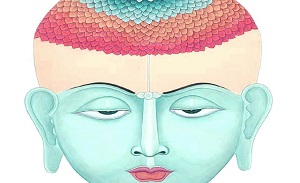Bai Hui Acupressure Point
 In the Chinese way of metaphorically signifying things, “one hundred” basically means “many.” So, in the case of Bai Hui, the “hundred convergences” refer to the convergence of the six yang channels and the governing vessel (du Mai), all of which meet at DU20. Also converging at this point are the numerous bones of the skull. Bai Hui is also -- apropos of its use for treating various mental disorders (aka “shen disturbances”) -- considered to be the meeting-place of the “hundred spirits.” And, finally, it has been found to be effective in treating the “hundred diseases,” i.e. lots of different dis-eases.
In the Chinese way of metaphorically signifying things, “one hundred” basically means “many.” So, in the case of Bai Hui, the “hundred convergences” refer to the convergence of the six yang channels and the governing vessel (du Mai), all of which meet at DU20. Also converging at this point are the numerous bones of the skull. Bai Hui is also -- apropos of its use for treating various mental disorders (aka “shen disturbances”) -- considered to be the meeting-place of the “hundred spirits.” And, finally, it has been found to be effective in treating the “hundred diseases,” i.e. lots of different dis-eases.
Bai Hui & The Thousand-Petaled Lotus
Bai Hui is the uppermost point, on the physical body, of the Sushumna Nadi/Chong Meridian -- our body-mind's energetic core. It’s the location out of which emerges the “thousand-petaled lotus” (i.e. a continuous energetic fountaining) as the crown chakra opens, which frequently is perceived, via the inner vision, as being a kind of time-lapse photography view of the blossoming of a rose or peony.
Bai Hui In Chinese Medicine
In the practice of acupuncture and Chinese Medicine, Bai Hui is used generally to “clear the senses” and “calm the Spirit.” Specific disharmonies that it has proved effective in resolving include headache, tinnitus, nasal obstruction, vertigo, mental disorders and prolapse of the rectum or uterus.
Similar to REN1/Hui Yin, DU20 is used in relation to disorders manifesting at the two “poles” of our torso -- not surprising, given the trajectory of these meridians, from the pelvic floor and base of the spine on one end to the head on the other end. The joining of the Ren and Du meridians is the very purpose of the Microcosmic Orbit qigong practice.
How To Locate & Practice With Bai Hui - DU20
Locating Bai Hui is pretty simple: rest the tips of your thumbs at the uppermost point of your ears, as you reach your middle fingers up to touch one another, at the crown of your head. You may be able to fine-tune your location of DU20 by feeling for a spot that feels particularly “alive” or “active” energetically. Otherwise, just go for the summit of the mountain, so to speak.
“Acupressure” for Bai Hui consists simply of resting our middle fingers lightly on the point, as support for bringing our mental attention to rest gently there. It can also be used in conjunction with Hui Yin, by doing the Hui Yin acupressure practice, and then drawing your mental focus up to Bai Hui, as a way of drawing the energy generated in the lower dantian and Snow Mountain areas to the upper dantian.
As mentioned earlier, this is very similar to the Microcosmic Orbit practice. The basic idea is to support the transformation of Jing (whose home is the lower dantian) into Qi (whose home is the middle dantian) into Shen (whose home is the upper dantian), and vice versa.
By Elizabeth Reninger
https://www.learnreligions.com/

